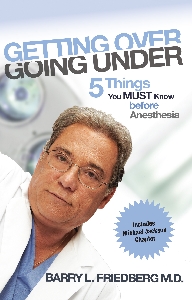
Contact: Scott Lorenz, President, Westwind Communications Book Marketing, 734-667-2090, scottlorenz@westwindcos.com
NEWPORT BEACH, Calif., Jan. 26, 2011 /Standard Newswire/ -- Every business needs a competitive advantage over its rivals. Some use a cost advantage; others use a differentiation advantage. Hospitals are not immune from the constant struggle to attract and retain patients and doctors.
Dr. Barry Friedberg says if hospitals want a competitive advantage that patients will appreciate, they need to institute the use of a brain monitor in all surgeries requiring sedation.
Dr. Friedberg is the author of Getting Over Going Under: 5 Things You MUST Know Before Anesthesia. (ISBN 978-0-9829169-0-2, 2010, Goldilocks Press, 116 pages, $18.95). He has been interviewed extensively on the subject of anesthesia and propofol by FOX, CNN, NBC and People Magazine.
Dr. Friedberg's book advocates the new 21st Century standard of care for anesthesiologists, explains why Americans may risk brain damage from anesthesia and advises how to get the best available technology to avoid that risk.
Many people fear waking up during surgery because of under-medication by the anesthesiologist, but Dr. Friedberg points out that by far, the greatest danger is over-medication. Those dangers include delirium, dementia or not waking up at all!
"The no brainer," says Dr. Friedberg, "is using a 'brain monitor' the disposable sensor for which only costs $20!"
An anesthesiologist with more than 30 years' experience, Friedberg says he remembers when the pulse oximeter, a device to measure a patient's oxygen level, first came on the market, "It was six years before its use became the accepted practice," says Friedberg. "Can you imagine doing a surgery today without a pulse oximeter? The brain monitor will also be a device every hospital uses in the very near future, but for now there's an opportunity for hospitals to tout it as a competitive advantage."
Friedberg also raises the issue of medical malpractice. "How long will it be before a medical malpractice lawyer sues a doctor and hospital because they 'failed to use' the best available technology to prevent postoperative brain damage?" asks Friedberg.
Until it becomes the new standard of care, Dr. Friedberg offers three free letters at his website for patients to use to request in requesting use of a brain monitor. The form letters are for the intended surgeon, anesthesiologist, and, if needed, the hospital administrator are available at: www.drbarryfriedberg.com
About Dr. Barry Friedberg
A board certified anesthesiologist for more than three decades, Dr. Friedberg is author of Anesthesia in Cosmetic Surgery as well as Getting Over Going Under. He developed The Friedberg Method of administering anesthesia in 1992 and the Goldilocks Anesthesia protocol in 1997. Dr. Friedberg was awarded a US Congressional award for applying his methods on wounded soldiers in Afghanistan and Iraq. The founder of the Goldilocks Foundation, Dr. Friedberg has been published and cited in several medical journals and textbooks.
For information contact Scott Lorenz, President of Westwind Communications Book Marketing 734-667-2090 or scottlorenz@westwindcos.com or www.westwindcos.com/book.




 Sign Up to Receive Press Releases:
Sign Up to Receive Press Releases: